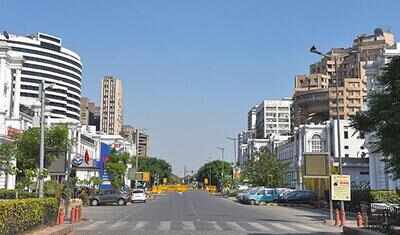Top Searches
- News
- City News
- delhi News
- Delhi to stay locked down till 5am, May 3

Connaught Place street wears a deserted look during the Covid-induced lockdown in Delhi on Sunday
NEW DELHI: The current lockdown in Delhi has been extended by a week — till 5am, May 3 — as Covid-19 continues to ravage the city.
Announcing the extension of the lockdown, which started on April 19, chief minister Arvind Kejriwal said on Sunday, “The lockdown is the last resort and last measure imposed in any fight against Covid, and Delhi’s situation was such that imposing a lockdown had become necessary.
However, the rise in cases has not come to a halt and they continue to climb at an alarming rate. In this context, it is the desire of the people as well that the lockdown should be extended.”
“In order to contain the spread of virus and further break the transmission chain, curfew needs to be extended... except for essential activities/services, as an emergency measure,” Delhi Disaster Management Authority stated in its order.
“During this lockdown, the positivity rate touched 36-37%. This is a new statistics for Delhi,” Kejriwal said. The rate has reduced a bit in the past two-three days and stood at below 30% on Sunday, but “this is not to say that the disease is ebbing, though that is the hope. It may increase or decrease in coming days, but our efforts will always be directed towards controlling the spread of the virus”, he added.
During the extended lockdown, all non-essential movements, including those of domestic workers, are prohibited and non-essential public places will remain shut. Public transport like Delhi Metro, DTC and Cluster Scheme buses, cabs and autos will continue to follow the restricted seating capacity norm while carrying only exempted people, such as government officials, police and healthcare personnel, and mediapersons.
Movement of individuals for wedding-related gatherings, restricted up to 50 people, is allowed on production of a soft or hard copy of the invitation card. Only up to 20 people can attend a funeral. All other gatherings remain prohibited. Bars and restaurants are closed but home delivery is allowed.
All goods can be transported without any e-pass. Courier services, services provided by self-employed people such as electricians, plumbers, and educational book shops can operate against production of e-passes.
Announcing the extension of the lockdown, which started on April 19, chief minister Arvind Kejriwal said on Sunday, “The lockdown is the last resort and last measure imposed in any fight against Covid, and Delhi’s situation was such that imposing a lockdown had become necessary.
However, the rise in cases has not come to a halt and they continue to climb at an alarming rate. In this context, it is the desire of the people as well that the lockdown should be extended.”
“In order to contain the spread of virus and further break the transmission chain, curfew needs to be extended... except for essential activities/services, as an emergency measure,” Delhi Disaster Management Authority stated in its order.
“During this lockdown, the positivity rate touched 36-37%. This is a new statistics for Delhi,” Kejriwal said. The rate has reduced a bit in the past two-three days and stood at below 30% on Sunday, but “this is not to say that the disease is ebbing, though that is the hope. It may increase or decrease in coming days, but our efforts will always be directed towards controlling the spread of the virus”, he added.
During the extended lockdown, all non-essential movements, including those of domestic workers, are prohibited and non-essential public places will remain shut. Public transport like Delhi Metro, DTC and Cluster Scheme buses, cabs and autos will continue to follow the restricted seating capacity norm while carrying only exempted people, such as government officials, police and healthcare personnel, and mediapersons.
Movement of individuals for wedding-related gatherings, restricted up to 50 people, is allowed on production of a soft or hard copy of the invitation card. Only up to 20 people can attend a funeral. All other gatherings remain prohibited. Bars and restaurants are closed but home delivery is allowed.
All goods can be transported without any e-pass. Courier services, services provided by self-employed people such as electricians, plumbers, and educational book shops can operate against production of e-passes.
FacebookTwitterLinkedinEMail
end of article
Trending Topics
Top Stories Right Now
- indiaCovid-19: In one week, India adds 22.5 lakh cases, deaths surge 89%
- indiaCovid-19: Second wave has shaken country, says PM Modi
- indiaLive: '5 tonnes of oxygen concentrators dispatched from New York to India'
- indiaActive cases may peak at 38-48 lakh in mid-May: Experts
- entertainmentOscars 2021: Live updates from the 93rd Academy Awards